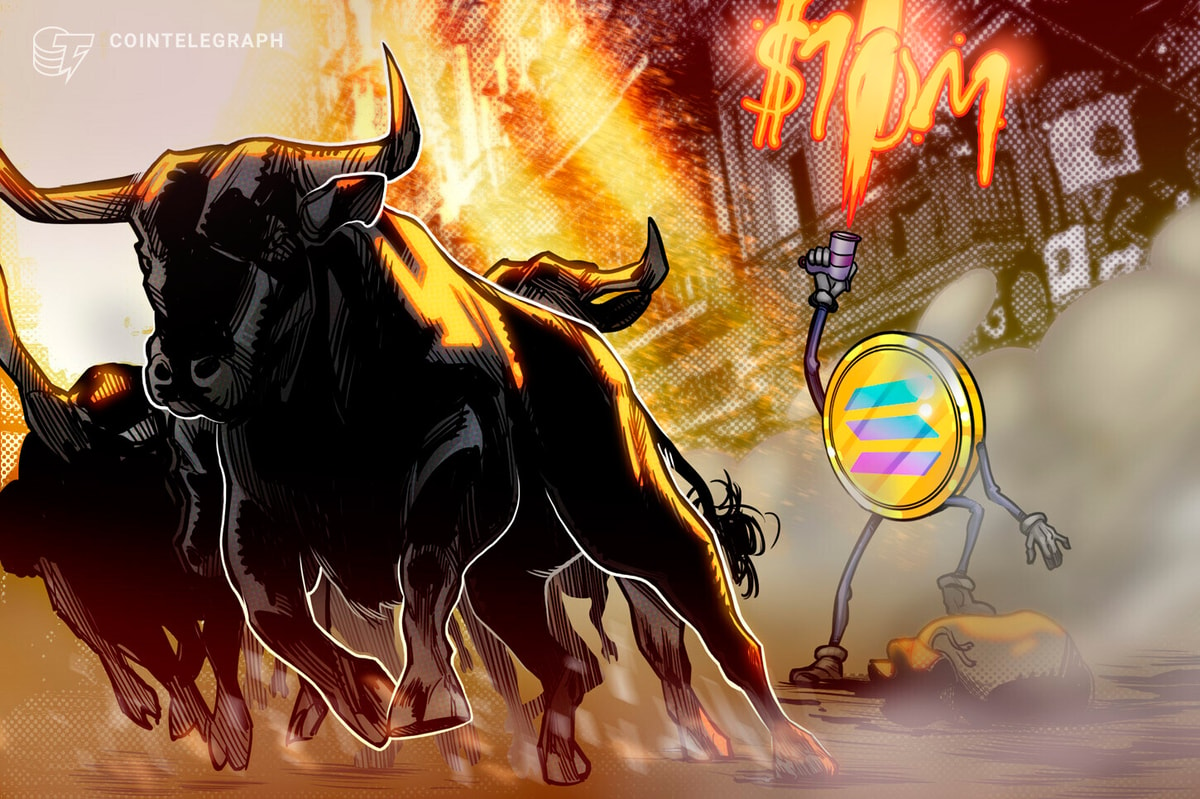Crypto analysts are predicting a year of significant financial gains for Solana, which is poised to see more adoption from new retail investors, partly driven by expectations of a spot Solana exchange-traded fund (ETF) in the US.
The artificial intelligence industry is also seeing a resurgence in investment thanks to growing interest in autonomous AI agents. Fetch.ai has launched a $10 million accelerator to support AI agent and quantum computing developments.
Solana poised for gains fueled by US ETF and retail adoption — Analyst
Solana is positioned for another year of significant growth in 2025, driven by increasing interest from retail investors and anticipation of a US-based Solana exchange-traded fund (ETF).
Solana (SOL) fell below the key $200 psychological mark on Jan. 9 after logging a more than 7% weekly decrease, Cointelegraph Markets Pro data shows.
SOL/USD, 1-month chart. Source: Cointelegraph
Despite the current correction, Solana is poised for a year of significant financial returns, which will be driven mainly by retail investors’ profit expectations, Nicolai Søndergaard, research analyst at Nansen, told Cointelegraph during an exclusive interview at the Emergence Prague 2024 event.
“[Solana’s appeal] is the function of expected profits. It’s that Solana seems cheaper. If you’re looking at a unit, you just think this is cheaper to buy,” Søndergaard said.
Fetch.ai launches $10 million accelerator for AI agent startups
Fetch.ai, a crypto artificial intelligence company built on Cosmos, announced a $10 million accelerator to support startups developing solutions focused on AI agents, quantum computing and high-performance tech.
The accelerator, operating through Fetch.ai’s Innovation Lab, aims to connect research with real-world applications. The lab, with hubs in San Francisco, London and India, will provide funding, mentorship and access to Fetch.ai’s agent-based technologies to help startups scale globally, according to a news release shared with Cointelegraph.
Humayun Sheikh, CEO of Fetch.ai and chairman of the ASI Alliance, told Cointelegraph that “agents will not only redefine how we build software but also serve as the execution layer for modern technologies.”
MiCA can attract more crypto investment despite overregulation concerns
Europe’s Markets in Crypto-Assets Regulation (MiCA) is being hailed as a significant step forward for the cryptocurrency industry despite concerns about potential overregulation during its initial rollout.
MiCA is the world’s first comprehensive regulatory crypto framework, which went into full effect for crypto-asset service providers on Dec. 30, 2024.
While concerns regarding regulatory overreach persist, the regulation is expected to be a net positive for the cryptocurrency industry in the long term, according to Dmitrij Radin, the founder of Zekret and chief technology officer of Fideum, a regulatory and blockchain infrastructure firm focused on institutions.
“Long-term, [MiCA is] absolutely positive. Every regulation helps us to mature the market. It will drive more funds and more users,” Radin told Cointelegraph during an interview at Emergence Prague.
Still, the regulation seeks to identify the “weak points of control” in the crypto space, which may mean more scrutiny for retail investors and end-users of crypto platforms, Radin said.
Fideum’s Dmitrij Radin, Interview with Cointelegraph’s Zoltan Vardai. Source: YouTube
Suspected insider wallets net $20 million on Solana’s Focai memecoin launch
At least 15 blockchain wallets suspected of insider trading have turned an initial $14,600 investment into more than $20 million, raising concerns about transparency and fairness in cryptocurrency markets.
The 15 insider wallets made over $20 million in profit on Focai.fun (FOCAI), a memecoin recently launched on Solana’s (SOL) memecoin launchpad Pump.fun.
The suspected insiders made an over 136,000-fold return on their initial $14,600 investment, which bought them more than 60.5% of the total token supply, according to onchain analytics firm Lookonchain. “They then sold all their $Focai for 94,175 $SOL($20.5M), netting 94,108 $SOL($20.48M).”
FOCAI insider wallets. Source: Lookonchain
The concentration of such a large share of tokens in a small number of wallets has drawn criticism from blockchain analysts. The situation highlights potential risks to decentralization, a key principle in cryptocurrency.
Ripple partners with Chainlink to boost RLUSD stablecoin in DeFi markets
Ripple, a blockchain-based payment protocol, has partnered with Chainlink, a decentralized oracle network, to improve the adoption and utility of its Ripple USD (RLUSD) stablecoin in decentralized finance (DeFi) applications.
The collaboration, announced on Jan. 7, will provide price feeds for RLUSD on Ethereum and the XRP Ledger, which aim to support cost-effective transactions and DeFi use cases for the enterprise-grade stablecoin.
RLUSD is pegged to the US dollar and will receive tamper-proof and accurate data from Chainlink through its decentralized nodes. The integration is designed to reduce risks of manipulation or downtime.
DeFi market overview
According to data from Cointelegraph Markets Pro and TradingView, most of the 100 largest cryptocurrencies by market capitalization ended the week in the red.
Of the top 100, the THORChain (RUNE) token fell over 29% as the week’s biggest loser, followed by the Virtuals Protocol (VIRTUAL) token, which fell over 22% on the weekly chart.
Total value locked in DeFi. Source: DefiLlama
Thanks for reading our summary of this week’s most impactful DeFi developments. Join us next Friday for more stories, insights and education regarding this dynamically advancing space.

Leave a Reply